Search
To search for an exact match, type the word or phrase you want in quotation marks.
A*DESK has been offering since 2002 contents about criticism and contemporary art. A*DESK has become consolidated thanks to all those who have believed in the project, all those who have followed us, debating, participating and collaborating. Many people have collaborated with A*DESK, and continue to do so. Their efforts, knowledge and belief in the project are what make it grow internationally. At A*DESK we have also generated work for over one hundred professionals in culture, from small collaborations with reviews and classes, to more prolonged and intense collaborations.
At A*DESK we believe in the need for free and universal access to culture and knowledge. We want to carry on being independent, remaining open to more ideas and opinions. If you believe in A*DESK, we need your backing to be able to continue. You can now participate in the project by supporting it. You can choose how much you want to contribute to the project.
You can decide how much you want to bring to the project.
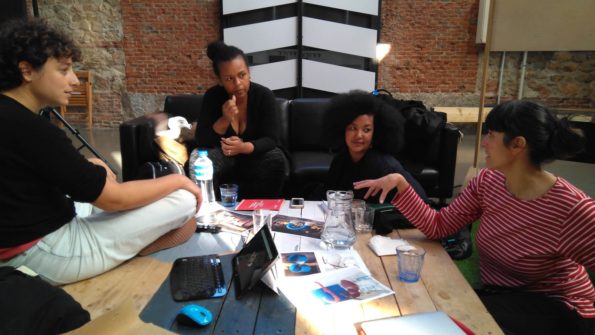
FelipaManuela is an independent platform based in Madrid dedicated to promoting research in contemporary art and culture through residencies for foreign curators, artists, writers, and educators, and through activities and publications. Its objective is to operate as a nucleus of professional exchange that promotes the internationalization of the local art ecosystem and creates collaboration networks between foreign professionals and Madrid residents.
Mela Dávila Freire – What prompted you to make the decision to start FelipaManuela, and what were the models, if any, that inspired you or the shortcomings that you attempted to correct with your idea? Is it a one-man project or is there a group of people behind it?
Andrea Pacheco González – The project was conceptualized at the end of 2010. I was returning to Madrid after studying in Barcelona, where I had collaborated with the now-defunct Can Xalant (Mataró) space. I held my first exhibition there, Casa Tomada: Una experiencia literal, in the public presentation of work by the artists-in-residence. Madrid was a wasteland back then, or at least that’s how I felt. The 2008 crisis had decimated spaces, experimental projects and independent initiatives, and artistic residencies weren’t part of the city’s cultural scene, except for the Casa de Velázquez program and El Ranchito, which was just beginning to take shape in Matadero. The huge, pharaonic, too-large-to-die cultural institutions were still standing, but for a migrant like me, saddled with raising my young daughter, without contacts in the art scene and without the credentials that are normally required to enter into exhibitions in Europe (Goldsmiths, De Apple, Bard College), Madrid was impenetrable.
However, in the middle of the crisis there was something like a fissure, a crack through which we were able to enter. I felt the personal need to open a transatlantic dialogue that took place outside of these rigid and hierarchical structures. I wanted to promote a non-hegemonic, non-Eurocentric space which would operate from and with the “periphery,” with a feminist and decolonial commitment, and which would incorporate human care and warmth. One that would create other types of relationships.
Very early on, I was invited to present the project at the School of Fine Arts in the UCM, and I remember the perplexity of an academic at the idea of starting an artistic residency in a private house with just one floor! “Residences are institutions, like the Rijksakademie,” she said. So, to create FelipaManuela, I had no models. Over time I discovered other inspiring initiatives, but originally this was a very homemade, personal initiative.
Although we are a non-profit cultural association and have a small work team, FelipaManuela has had a very strong curatorial character, which wasn’t a conscious decision at first. I wanted to open a space where I coul think with others, a space shared, contaminated, and appropriated by other knowledge and feelings, although in the end is has become inevitably tied to my concerns as a curator.
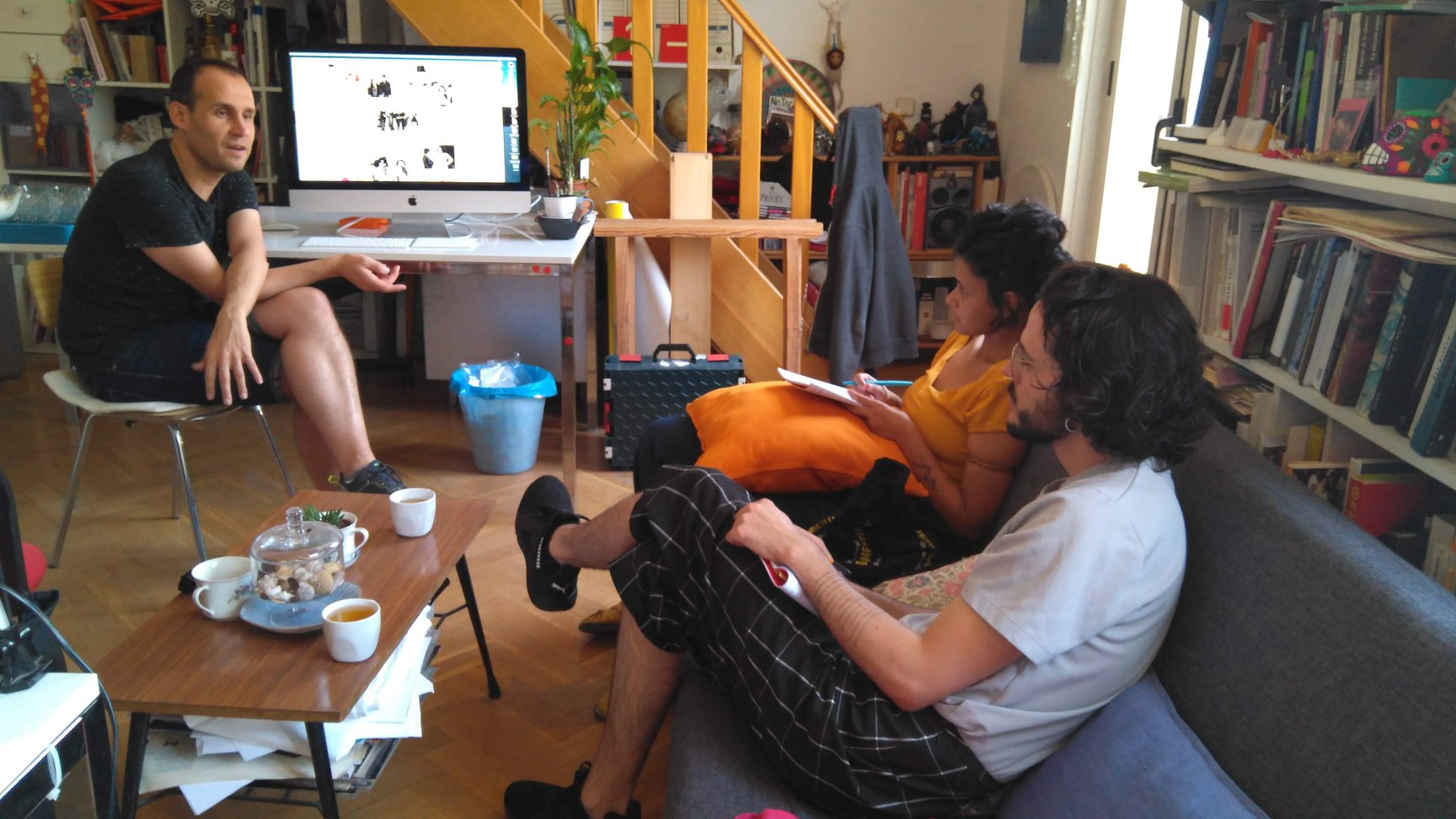
Beatriz Lemos, Diego del Valle and Diego del Pozo. Residency program of curatorial research, june 2019. Felipamanuela – Acción Cultural Española
MDF- How did you imagine the economic survival of the project in its early days, and how have your plans changed or been confirmed as FelipaManuela has become consolidated?
APG- The sustainability of the space has been and continues to be a constant challenge, it is where our greatest fragility lies. Before, there were public grants that subsidized projects, but they didn’t pay the salaries of the team that developed them, so we had to look for other formulas. For a few years, by renting out rooms we were able to pay for rent and supplies, as well as very minimal administration and management salaries. But tourist hostels, the proliferation of other residential projects, and even private rental rooms for short stays diminished these options. Very soon, offering accommodation was no longer an economic possibility.
I have studied formulas for other spaces that sell art work, receive private support or produce specific projects, but this never happened here. Everything is fragile, unstable, and precarious, even if private agents are incorporated. Collaborations with cultural institutions come and go, they do not maintain any real or sustained commitment to independent artistic spaces. I recently learned that Flora (arteflora.org) was no longer active in Bogotá. This is, I fear, a trend that will affect those who have based their programming and economy on mobility, especially with the pandemic.
Today, we only survive thanks to public grants, specifically grants that the Madrid City Council has offered since 2017 to contemporary art spaces. FelipaManuela has managed to maintain its space, its programming, and a small team thanks to these grants, and I hope that the City Council continues to fund us.
MDF- FelipaManuela emphasizes the house in the Delicias neighborhood where the residents stay as their “physical base,” but also as an intellectually and spiritually important element. You have mentioned in the past that the support network that the previous tenant of this house created to survive as a widowed mother in the Spanish postwar period is a source of inspiration for the program. But in addition to accommodation, the “residency,” the program administers other processes, such as the selection of candidates or the organization of its activities in Madrid, which require a method. How would you define Felipa Manuela’s work methodology?
APG- A few years ago, I read an interview with the Mexican curator Sofía Hernández Chong Cuy in which, when talking about her work, she used a concept with which I felt and still feel identified: “informed intuition.” My method includes rigorous research and constant attention to the art world’s needs, challenges, and shortcomings. This implies not only thinking about a context in geographical terms, but also understanding the historical moment that we live in and its connection to the past that we carry with us. It implies thinking “with one’s guts,” as Cusicanqui says, and that’s where intuition come in. My work as director of FelipaManuela is curatorial. I do not differentiate between collaborating with artists, organizing an exhibition or developing a project at FelipaManuela. I work more and earn less, but it is my project and it has given me enormous satisfaction. My method is based on an insatiable appetite and an inexhaustible intellectual curiosity regarding the time and place in I live, and the ways in which artistic practices are capable of offering us a narrative of the present moment.
MDF- From the perspective of your independent project, how do you see yourself as an institution? What is FelipaManuela’s relationship with art institutions? Is there any stable form of cooperation with other institutions?
APG- No. As I said, I believe that, in many parts of the world, cultural ecosystems show a horrible lack of institutions generating and sustaining a real commitment to independent initiatives. We suffer from constant heartbreak, a lack of concern for our fragility and a genuine appreciation of our work. We have collaborated on specific projects with institutions here in Madrid, but this has always depended on the particular interest of someone in an institution, not on the institution itself. In my experience, there has been no institutional policy to strengthen these networks, nor to sustain projects over time.
This is something that I can’t understand since spaces are artistic agents that respond to a context, in the same way that an artist does. In addition, there are museums that are developing exhibition projects that are retrospectives of the work coming from independent spaces in the city. Another example: a few years ago, ARCO organized conferences about collaboration networks between Latin America and Europe, and invited some directors of independent spaces in Latin American, such as Patricia Belli from Espira Espora (Nicaragua) and Raquel Schwartz from Kiosko (Bolivia), but for this conversation no local independent space was invited, not from Madrid and not even from Spain. Not a single one. The other part of the dialogue, that is, the “local counterpart” of these spaces, was left in the hands of an institution.
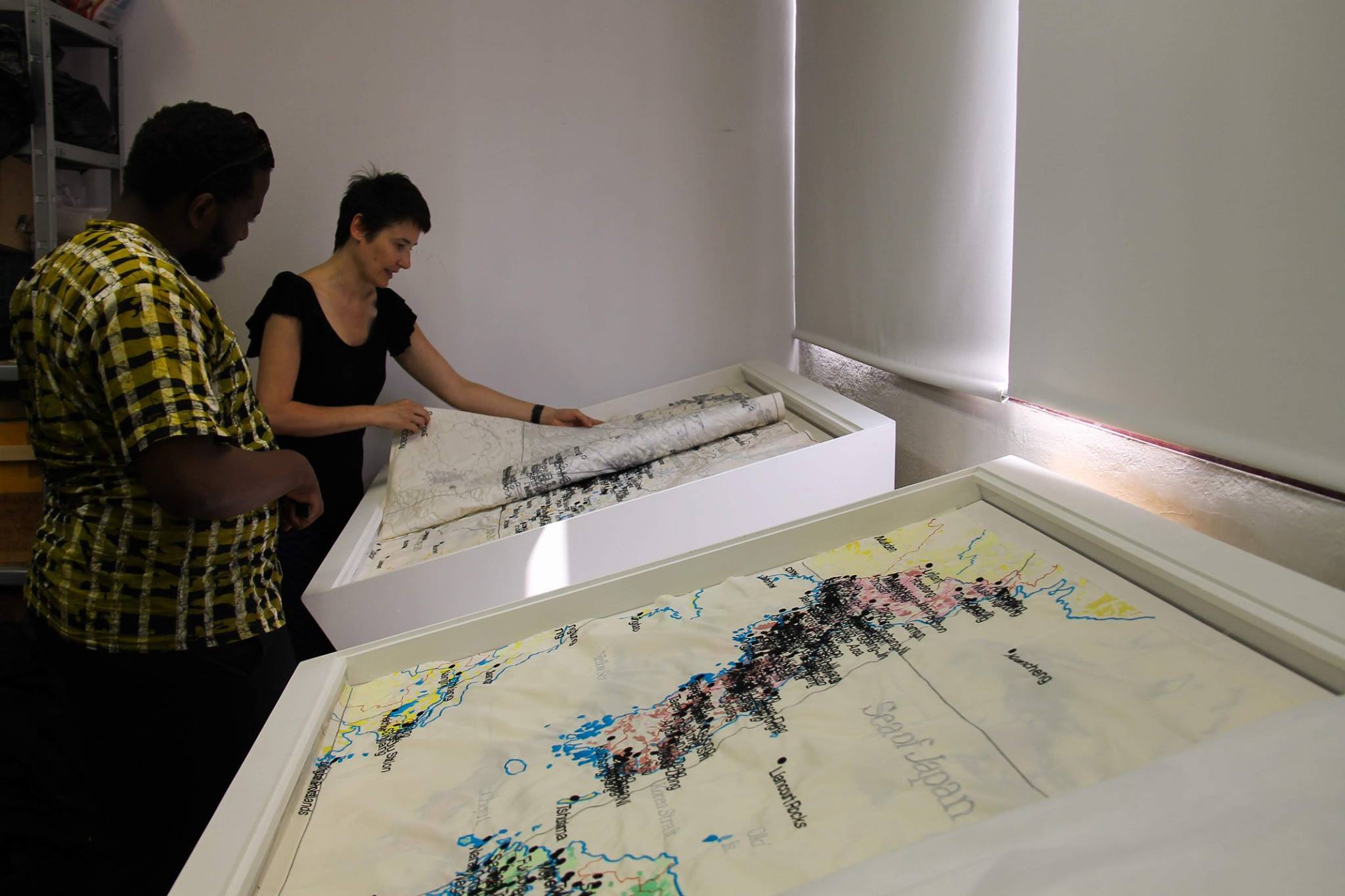
Moses Serubiri and Cristina Lucas. Research program of curatorial research, june 2018. Felipamanuela – Centro de Residencias de Matadero Madrid.
MDF- Due to the current health crisis, many sectors, including culture, have been affected more than ever before. It is still difficult to draw conclusions but the signs point to a serious weakening of the art world, especially the non-institutional sector. How is the situation affecting FelipaManuela? Do you think that things will get better soon, or do you think that a new, even greater precariousness is here to stay?
APG- This crisis is not going to bring us down but it is going to transform us. We have learned how to move within hostile contexts, we have our survival strategies and some muscle. We are agile, our load is light and we are not afraid of change. We are migrant women, we know how to survive.
I do believe, however, that this situation is going to cause changes in the way we work at FelipaManuela. In conceptual terms, our commitment to the most vulnerable communities is even more intense, and our focus continues to be on artistic practices that address the urgencies of the present, but we will move (we are already moving) towards another working model.
Part of our activity perhaps isn’t sustainable as it depends on international travel, which has been affected by this global crisis. The art world, including independent initiatives like us, worked within a model that was unsustainable. It has been wonderful to bring people from Latin America and the Caribbean to share a residency experience here, but in the heat of this crisis we must rethink this. Imagination will be a fundamental element to accompany us on this journey.
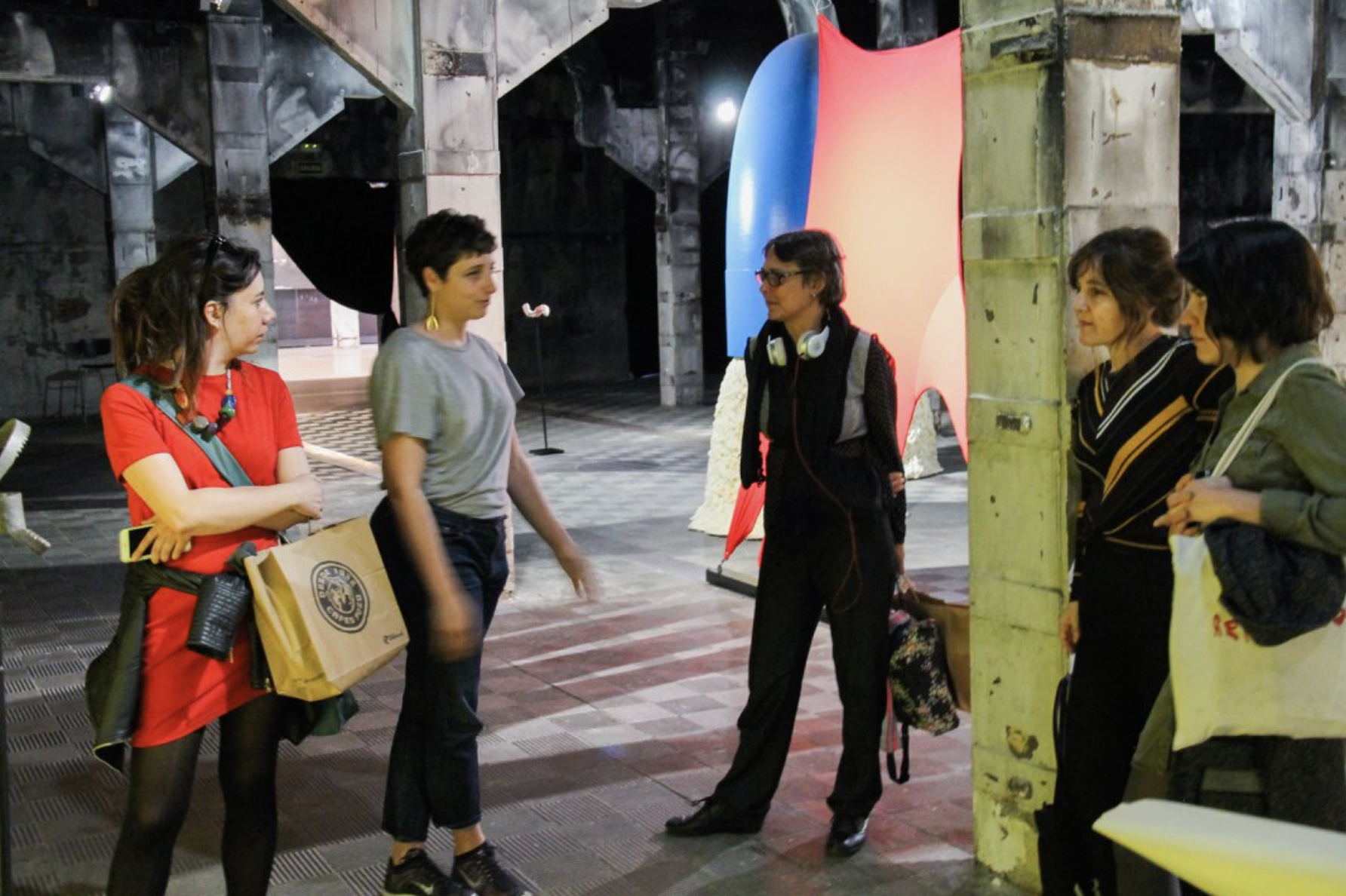
Micky Marxuach, Ximena Gama, Pamela Desjardins, Andrea Pacheco and Teresa Solar. Research program of curatorial research, may 2018. Felipamanuela – Acción Cultural Española.
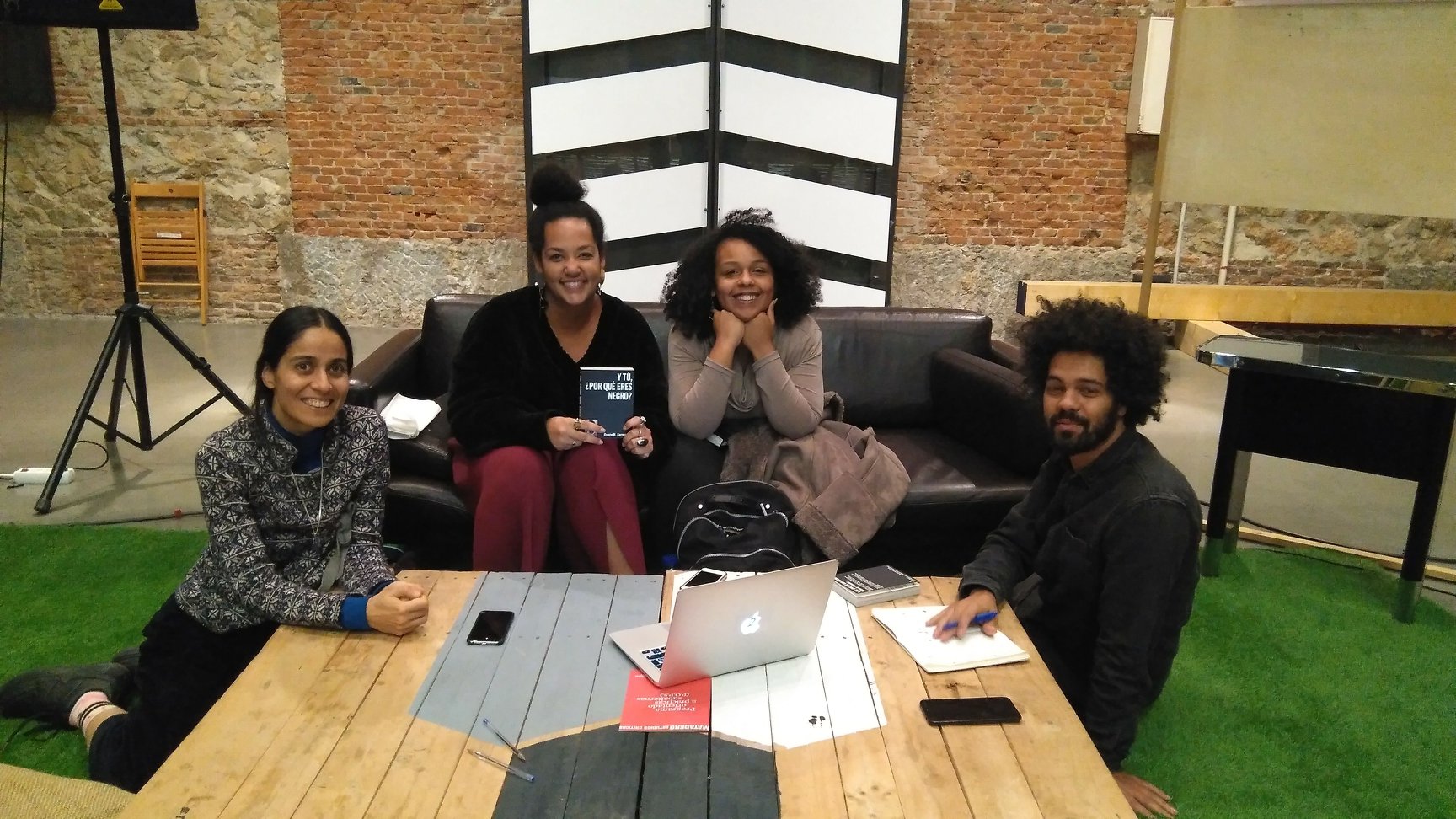
Manuela Villa, Diane Lima, María Elena Ortiz and Ruben H. Bermúdez. Residency Program of curatorial research, november 2018. Felipamanuela – Centro de Residencias Artísticas Matadero Madrid.
(Featured Image: Diane Lima, María Elena Ortiz, Teresa Solar and Asunción Molinos Gordo. Residency Program of curatorial research, november 2018. Felipamanuela – Centro de Residencias Artísticas Matadero Madrid).
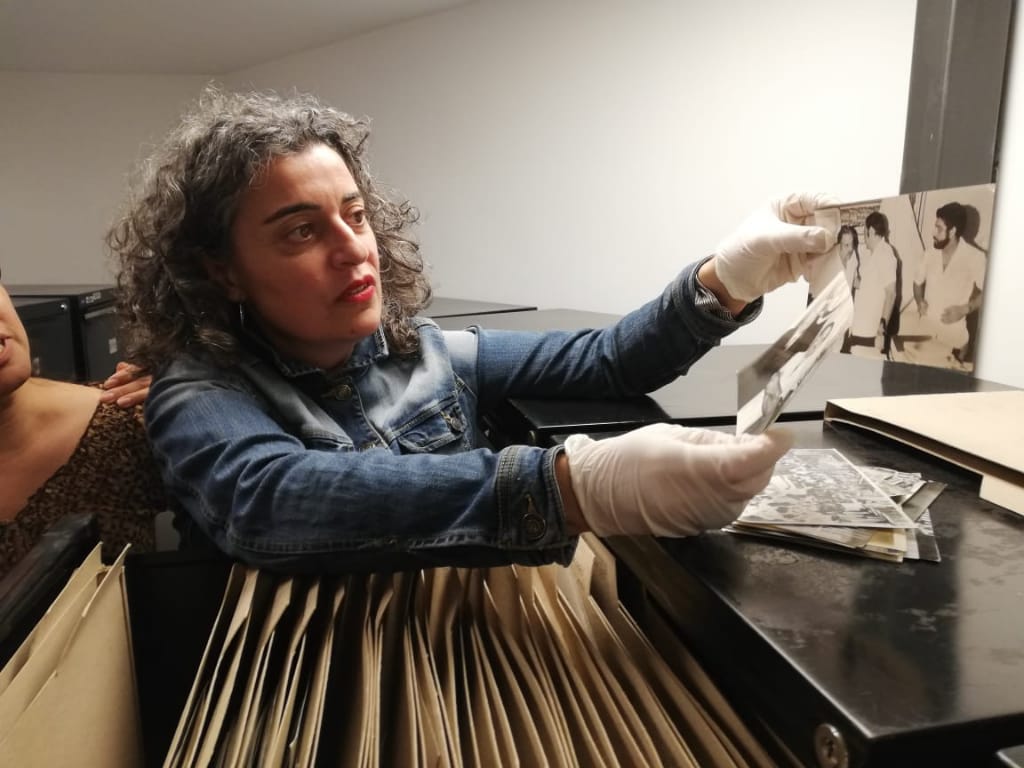
Mela Dávila Freire. Recently, a poster announced her lecture at an art school with this title: “Mela Dávila is not a graphic designer, she is not an editor, and she is not an artist, either.” Combining periods in which she has worked in art institutions with other when she worked as a freelancer, Mela traces a path that at first involved translating, coordinating and editing, then later focused on archives, and recently encompasses research, writing, and curating. Although she still has not found a name for her profession, she increasingly likes the lack of a straight line in her career.
"A desk is a dangerous place from which to watch the world" (John Le Carré)